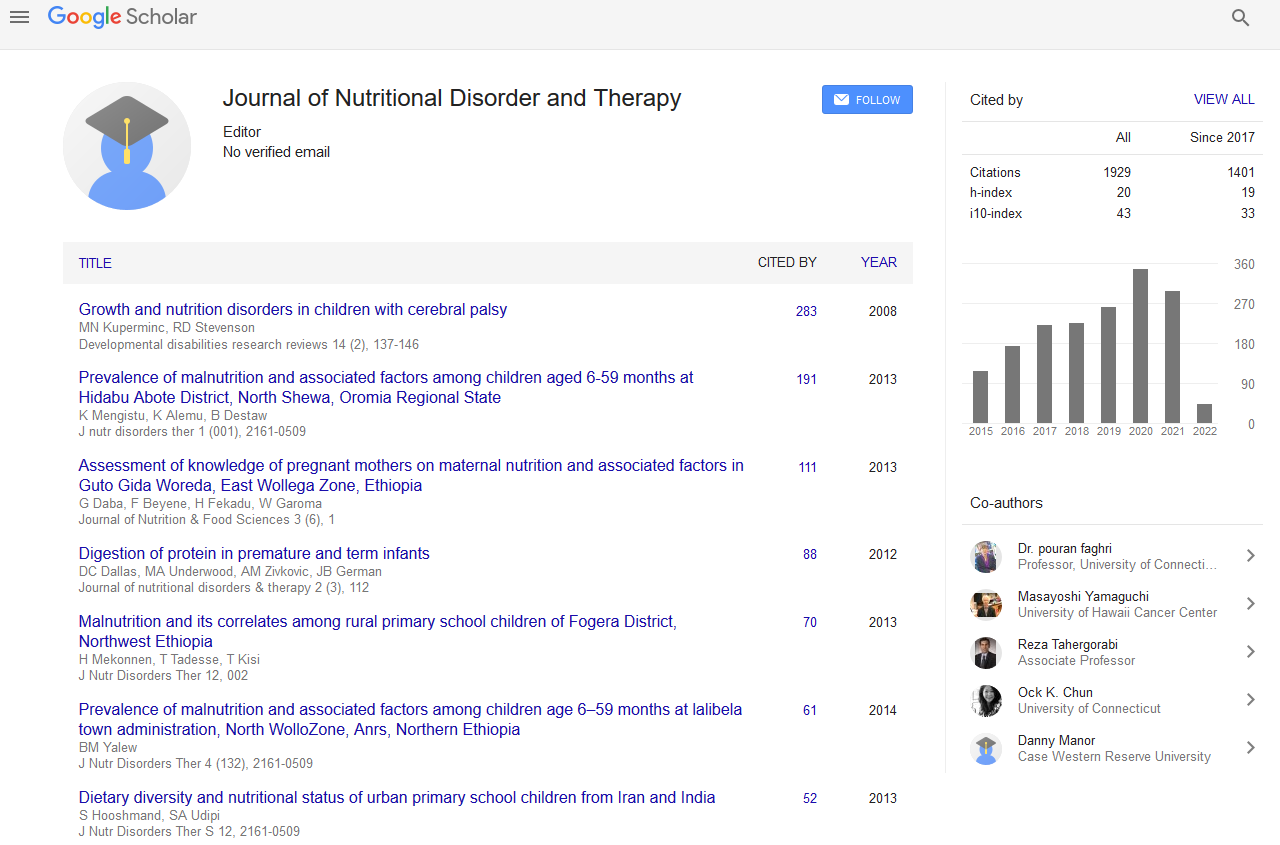Indexed In
- Open J Gate
- Genamics JournalSeek
- Academic Keys
- JournalTOCs
- Ulrich's Periodicals Directory
- RefSeek
- Hamdard University
- EBSCO A-Z
- OCLC- WorldCat
- Publons
- Geneva Foundation for Medical Education and Research
- Euro Pub
Useful Links
Share This Page
Journal Flyer

Open Access Journals
- Agri and Aquaculture
- Biochemistry
- Bioinformatics & Systems Biology
- Business & Management
- Chemistry
- Clinical Sciences
- Engineering
- Food & Nutrition
- General Science
- Genetics & Molecular Biology
- Immunology & Microbiology
- Medical Sciences
- Neuroscience & Psychology
- Nursing & Health Care
- Pharmaceutical Sciences
Beverage intake and its covariates among private university students in Lebanon
15th International Conference on Clinical Nutrition
May 24-26, 2018 | Vienna, Austria
Doris Jaalouk and Jocelyne Boumosleh
Notre Dame University-Louaize, Lebanon
Scientific Tracks Abstracts: J Nutr Disorders Ther
Abstract:
A total of 391 undergraduate private university students completed three questionnaires: 73- item food frequency questionnaire, background questionnaire (socio-demographic & lifestyle factors), and International Physical Activity Questionnaire (IPAQ) - short form. Daily calorie intake was assessed using the Nutritionist Pro-Diet Analysis software. Statistical analyses were performed using SPSS version 22 for Windows. Mean daily intake of water was the highest, followed by Sugar Sweetened Beverages (SSBs) (fruit drinks, soft drinks, & energy drinks), coffee/ tea with sugar, diet beverages, and alcoholic beverages. Consumption levels of different types of beverages varied significantly by gender. The contribution to daily calorie intake from beverages followed the mean daily intake of a beverage in the total sample, and in men and women separately. Daily water intake was found to be significantly associated with increased number of meals per day and dietary supplement intake in men, and with high level of physical activity and lack of depression in women. Fresh fruit juice intake associated with older age and less frequent meals only in men. SSBs consumption associated with younger age and increased frequency of alcohol drinking in men, and with decreased frequency of breakfast consumption and depression in women. Intake of diet beverages associated with obesity status, risky waist circumference, and smoking in men, overweight status in women, and following a special diet and unhealthy eating behaviors in both. Alcoholic beverages�?? intake had significant association with living in own apartment/other, smoking and increased frequency of alcohol drinking in men and women, and with overweight in men and unhealthy eating behaviors in women. Study findings can be used to inform about interventions to reduce intake of unhealthy beverages and promote consumption of healthy ones among young adults.
Biography :
Doris Jaalouk earned her PhD in Cell biology from Université de Sherbrooke, Canada, in 1997, and soon joined the Faculty of Natural & Applied Sciences at Notre Dame Univeristy (NDU), Lebanon. Subsequent to earning a Master of Public Health, emphasis-health education and behavior, in 2009, she became affiliated with the Faculty of Nursing & Health Sciences. She has been teaching courses in health sciences and human physiology. Her areas of research interest include nutrition and mental health, child nutrition and health and development, non-communicable chronic diseases particularly cardiovascular diseases.
Email:djaalouk@ndu.edu.lb


